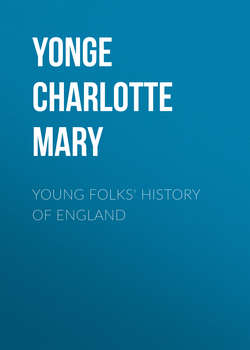Young Folks' History of England

Реклама. ООО «ЛитРес», ИНН: 7719571260.
Оглавление
Yonge Charlotte Mary. Young Folks' History of England
CHAPTER I. JULIUS CÆSAR. B.C. 55
CHAPTER II. THE ROMANS IN BRITAIN. A.D. 41—418
CHAPTER III. THE ANGLE CHILDREN. A.D. 597
CHAPTER IV. THE NORTHMEN. A.D. 858—958
CHAPTER V. THE DANISH CONQUEST. A.D. 958—1035
CHAPTER VI. THE NORMAN CONQUEST. A.D. 1035—1066
CHAPTER VII. WILLIAM THE CONQUEROR. A.D. 1066—1087
CHAPTER VIII. WILLIAM II., RUFUS. A.D. 1087-1100
CHAPTER IX. HENRY I., BEAU-CLERC. A.D. 1100—1135
CHAPTER X. STEPHEN. A.D. 1135—1154
CHAPTER XI. HENRY II., FITZ-EMPRESS. A.D. 1154-1189
CHAPTER XII. RICHARD I., LION-HEART. A.D. 1189—1199
CHAPTER XIII. JOHN, LACKLAND. A.D. 1199—1216
CHAPTER XIV. HENRY III., OF WINCHESTER. A.D. 1216—1272
CHAPTER XV. EDWARD I., LONGSHANKS. A.D. 1272—1307
CHAPTER XVI. EDWARD II., OF CAERNARVON. A.D. 1307—1327
CHAPTER XVII. EDWARD III. A.D. 1327—1377
CHAPTER XVIII. RICHARD II. A.D. 1377—1399
CHAPTER XIX. HENRY IV. A.D. 1399—1413
CHAPTER XX. HENRY V., OF MONMOUTH. A.D. 1413—1423
CHAPTER XXI. HENRY VI., OF WINDSOR. A.D. 1423—1461
CHAPTER XXII. EDWARD IV. A.D. 1461—1483
CHAPTER XXIII. EDWARD V. A.D. 1483
CHAPTER XXIV. RICHARD III. A.D. 1483—1485
CHAPTER XXV. HENRY VII. A.D. 1485—1509
CHAPTER XXVI. HENRY VIII. AND CARDINAL WOLSEY. A.D. 1509—1529
CHAPTER XXVII. HENRY VIII. AND HIS WIVES. A.D. 1528—1547
CHAPTER XXVIII. EDWARD VI. A.D. 1547—1553
CHAPTER XXIX. MARY I. A.D. 1553—1588
CHAPTER XXX. ELIZABETH. A.D. 1558—1587
CHAPTER XXXI. ELIZABETH'S REIGN. A.D. 1587—1602
CHAPTER XXXII. JAMES I. A.D. 1602—1625
CHAPTER XXXIII. CHARLES I. A.D. 1625—1649
CHAPTER XXXIV. THE LONG PARLIAMENT. A.D. 1641—1649
CHAPTER XXXV. DEATH OF CHARLES I. A.D. 1649—1651
CHAPTER XXXVI. OLIVER CROMWELL. A.D. 1649—1660
CHAPTER XXXVII. CHARLES II. A.D. 1660-1685
CHAPTER XXXVIII. JAMES II. A.D. 1685—1688
CHAPTER XXXIX. WILLIAM III. AND MARY II. 1689—1702
CHAPTER XL. ANNE. A.D. 1702—1714
CHAPTER XLI. GEORGE I. A.D. 1714—1725
CHAPTER XLII. GEORGE II. A.D. 1725—1760
CHAPTER XLIII. GEORGE III. A.D. 1760—1785
CHAPTER XLIV. GEORGE III. A.D. 1785—1810
CHAPTER XLV. GEORGE III.—THE REGENCY. A.D. 1810—1820
CHAPTER XLVI. GEORGE IV. A.D. 1820—1830
CHAPTER XLVII. WILLIAM IV. A.D. 1830—1837
CHAPTER XLVIII. VICTORIA. A.D. 1837—1855
CHAPTER XLIX. VICTORIA. A.D. 1857—1860
CHAPTER L. VICTORIA. A.D. 1860—1872
QUESTIONS FOR EXAMINATION
Отрывок из книги
It was nearly a hundred years before any more of the Romans came to Britain; but they were people who could not hear of a place without wanting to conquer it, and they never left off trying till they had done what they undertook.
One of their emperors, named Claudius, sent his soldiers to conquer the island, and then came to see it himself, and called himself Brittanicus in honor of the victory, just as if he had done it himself, instead of his generals. One British chief, whose name was Caractacus, who had fought very bravely against the Romans, was brought to Rome, with chains on his hands and feet, and set before them emperor. As he stood there, he said that, when he looked at all the grand buildings of stone and marble in the streets, he could not think why the Romans should want to take away the poor rough-stone huts of the Britons. The wife of Caractacus, who had also been brought a prisoner to Rome, fell upon her knees imploring for pity, but the conquered chief asked for nothing and exhibited no signs of fear. Claudius was kind to Caractacus; but the Romans went on conquering Britain till they had won all the part of it that lies south of the river Tweed; and, as the people beyond that point were more fierce and savage still, a very strong wall, with a bank of earth and deep ditch was made to keep them out, and always watched by Roman soldiers.
.....
The Britons used to call the blue-eyed men Saxons; but they called themselves Angles, and the country was called after them Angle-land. Don't you know what it is called now? England itself, and the people English. They spoke much the same language as we do, only more as untaught country people, and they had not so many words, because they had not so many things to see and talk about.
As to the Britons, the English went on driving them back till they only kept their mountains. There they have gone on living ever since, and talking their own old language. The English called them Welsh, a name that meant strangers, and we call them Welsh still, and their country Wales. They made a great many grand stories about their last brave chief, Arthur, till, at last, they turned into a sort of fairy tale. It was said that, when King Arthur lay badly wounded after his last battle, he bade his friend fling his sword into the river, and that then three lovely ladies came in a boat, and carried him away to a secret island. The Welsh kept on saying, for years and years, that one day king Arthur would wake up again, and give them back all Britain, which used to be their own before the English got it for themselves; but the English have had England now for thirteen hundred years, and we cannot doubt they will keep it as long as the world lasts.
.....